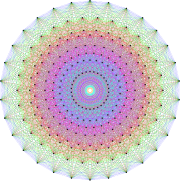
Back Cartan-Unteralgebra German Sous-algèbre de Cartan French תת-אלגברת קרטן HE カルタン部分環 Japanese 카르탕 부분 대수 Korean Подалгебра Картана Russian Підалгебра Картана Ukrainian 嘉当子代数 Chinese
| Lie groups and Lie algebras |
|---|
 |
In mathematics, a Cartan subalgebra, often abbreviated as CSA, is a nilpotent subalgebra of a Lie algebra that is self-normalising (if for all , then ). They were introduced by Élie Cartan in his doctoral thesis. It controls the representation theory of a semi-simple Lie algebra over a field of characteristic .
In a finite-dimensional semisimple Lie algebra over an algebraically closed field of characteristic zero (e.g., ), a Cartan subalgebra is the same thing as a maximal abelian subalgebra consisting of elements x such that the adjoint endomorphism is semisimple (i.e., diagonalizable). Sometimes this characterization is simply taken as the definition of a Cartan subalgebra.[1]pg 231
In general, a subalgebra is called toral if it consists of semisimple elements. Over an algebraically closed field, a toral subalgebra is automatically abelian. Thus, over an algebraically closed field of characteristic zero, a Cartan subalgebra can also be defined as a maximal toral subalgebra.
Kac–Moody algebras and generalized Kac–Moody algebras also have subalgebras that play the same role as the Cartan subalgebras of semisimple Lie algebras (over a field of characteristic zero).
- ^ Hotta, R. (Ryoshi) (2008). D-modules, perverse sheaves, and representation theory. Takeuchi, Kiyoshi, 1967-, Tanisaki, Toshiyuki, 1955- (English ed.). Boston: Birkhäuser. ISBN 978-0-8176-4363-8. OCLC 316693861.


![{\displaystyle [X,Y]\in {\mathfrak {h}}}](https://wikimedia.org/api/rest_v1/media/math/render/svg/00ecf5117d879bf80909b9bdc3b61f49a2c97f62)




